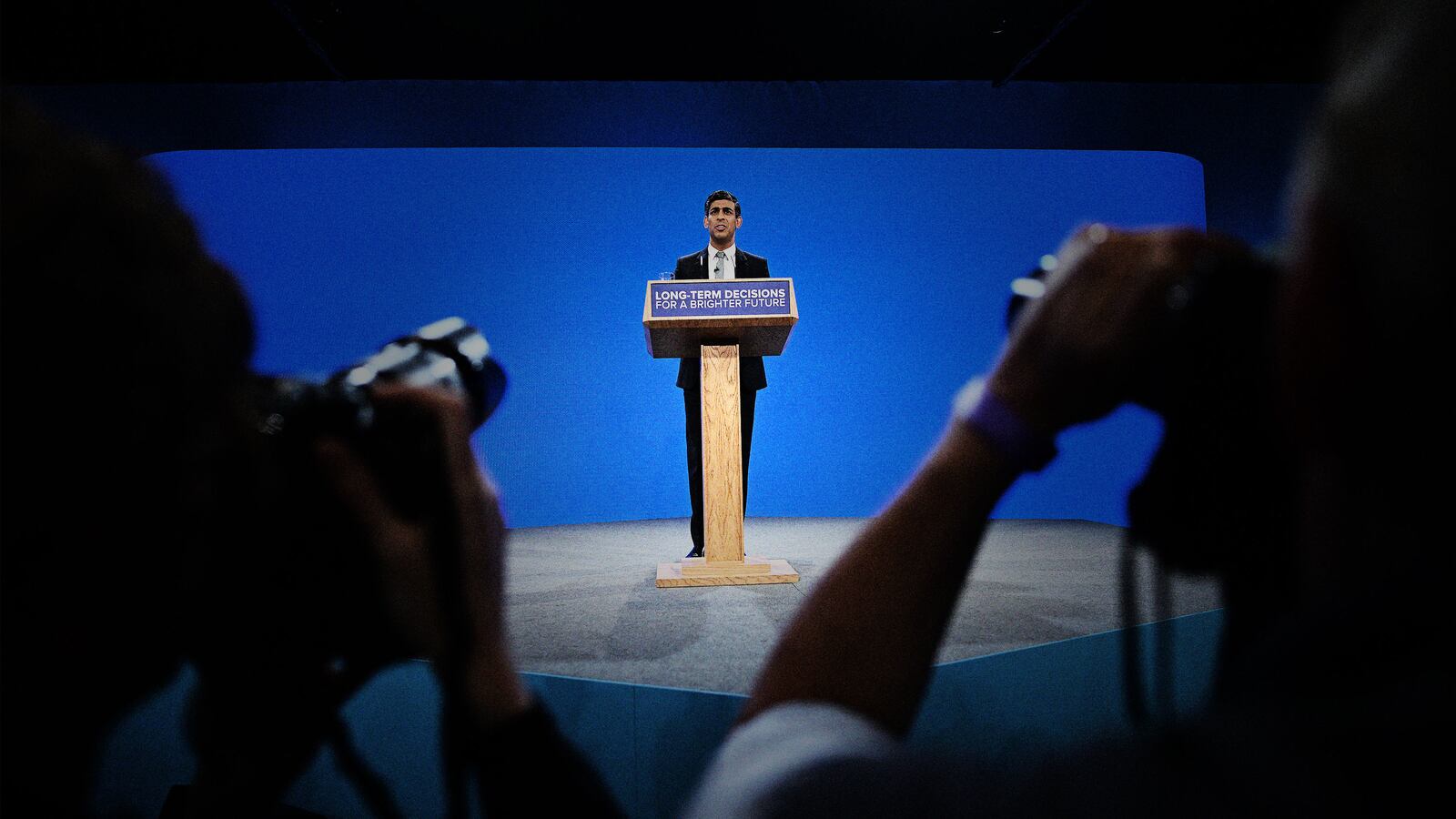LONDON—A crucial difference between the dinosaurs and Britain’s ruling Conservative Party is that the dinosaurs had no way of knowing the asteroid was coming. For the Tories, portents of doom abound, with some polls suggesting that an extinction-level event of catastrophic political losses could be on the way in the next general election. Prime Minister Rishi Sunak has signaled that he’ll call the election in the second half of the year, and it can legally come no later than January 2025.
With his party trailing the opposition Labour Party by over 20 points, most pundits expect the election will be the end of Tory rule. But will it be the end of the Conservative Party altogether?
Lawmakers will get an early, if imperfect, indication of whether a Tory Götterdämmerung is in the making on Thursday, when local elections are held across England and Wales. The complex and varied ballots—which include elections for thousands of local council seats, several regional mayors, and law enforcement officials—will not affect the makeup of the British parliament or pose a direct threat to Sunak’s grip on power. But some Tories fear this could be where the unraveling of the world’s oldest operating—and electorally most successful—political party begins.
“This is the first of two stages of Conservative annihilation,” one former Conservative minister told The Daily Beast, the second being the general election when it arrives. “People have completely switched off and have become unpersuadable. They’ve made up their mind and they just want the nightmare to be over.”
Even those who think reports of the Conservative Party’s impending political death are greatly exaggerated still expect the Tories to get smoked in the May 2 local elections, with some experts suggesting that the party could lose as many as half of its council seats.
Part of the problem is that the Tories did so well three years ago when many of the seats currently up for grabs were last contested. “May 2021 is when Boris Johnson was prime minister—remember him?” Sir John Curtice, Britain’s leading political scientist and professor at the University of Strathclyde, told The Daily Beast. At the time the Tories were well ahead of Labour in the national polls and enjoying a surge in popularity after the rollout of COVID-19 vaccines. “A completely, completely different world,” Curtice said. “And the problem that the Tories therefore face is that they are defending a good year against the backdrop of an opinion poll situation where they’re 20 points behind.”
“I think nationally the Tories will be trounced as you would expect in a midterm,” another ex-Tory minister told The Daily Beast, while a current Conservative member of parliament (MP) said, “We’re obviously going to lose” many races given the successes of 2021.
The MP instead said the “interesting” aspect of next week’s elections will be the re-election bids of two incumbent Tory mayors—Andy Street in the West Midlands and Ben Houchen in the northeastern Tees Valley. Both politicians enjoy personal popularity in their local areas, so bad results in their races could be interpreted by some Tory lawmakers as unignorable warning signs about the intensity of sentiment against their party throughout the country.
“If both of them were to go, there would be considerable concern,” the Tory lawmaker said. “But what Conservative MPs would do about it, I don’t know.” The MP added that because a general election is potentially just months away, they’re not convinced “anybody is actually going to do anything completely mad”—by which they mean a move to topple Sunak and replace him with a new leader before the national ballot arrives. “We’ll have to see—I can never predict what my colleagues do,” the MP said. “It would be ridiculous.”
Ridiculous indeed. Since returning to power in 2010 after 13 years in opposition, the Conservatives have treated Britain to no fewer than five different prime ministers. Of those, just two (David Cameron and Boris Johnson) decisively won national elections, while a third (Theresa May) came out of an election with no clear majority, and needed the support of another party to govern. Liz Truss was installed as the leader of a country of 68 million people on the basis that a little over 81,000 Conservative Party members voted for her in a contest triggered by Johnson’s scandal-riddled downfall. And Sunak—the fifth Tory prime minister in just six years—came to power because a grand total of 193 people chose him to be the man to mop up the history-making mess of Truss’ unprecedentedly brief stint in Downing Street.
Curtice, the polling guru, estimated that the Labour party now has a “99 percent chance” of forming the next British government when the general election comes. “The Tories do face the not inconsiderable risk of turning up with their worst ever result in modern parliamentary history,” Curtice said. “But it may not be quite as bad as the fate of the Tories in Canada.”
That’s a reference to the cataclysmic performance of the Progressive Conservatives in Canada in 1993. After nine years in power, the PC lost all but two of its federal seats in one of the worst electoral defeats for a governing party ever seen in the Western world. The crushing result, which precipitated the party’s eventual dissolution, has been invoked by some British media reports on the upcoming U.K. general election owing to certain parallels between the circumstances the Canadian conservatives faced then and those which British Tories are navigating now.
If not a complete wipeout, how bad could it get for Britain’s Tories? As bad as 1997, perhaps, when John Major led the party into its worst defeat in a century? Some in the party seem to be taking comfort in the perception that the current Labour leader, Keir Starmer, is not as charismatic a figure as his 1997-landslide-winning predecessor Tony Blair. As one former Tory minister put it: “Mother Teresa couldn’t have beaten Blair.” Polling on Sunak’s personal popularity, though, also makes for pretty bleak reading from the Tory standpoint.
There is also another existential threat to the Conservative Party: itself. The party is riven by factional infighting which has already created major headaches for Sunak. One alliance from five rebellious, rightwing factions dubbed the “five families” has given him hell over migration policy. Liz Truss even launched a new “Popular Conservatism” faction in February which quickly set about giving Sunak’s policies a kicking, and promised to be part of the battle against “left-wing extremists.” Even if the Tories avoid total wipe-out in the general election, a heavy defeat could turn bitter factional divisions into an outright breakup of the Conservative Party.
Conservative MPs are now simply left to wait and ponder their own fate. Many doubtless already feel endangered—and are thinking about who’s to blame for their current predicament.
“We’ve had eight years of turmoil, total division, intellectual bankruptcy, a collapse in party discipline, and MPs who just don’t know how to behave,” one former Tory minister said. “They think they matter. And people now think they don’t.”







